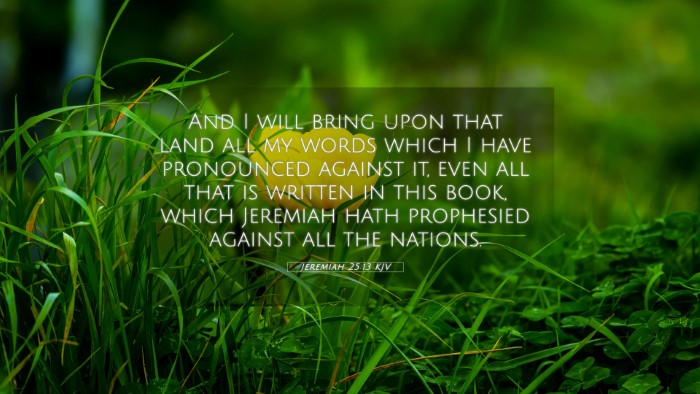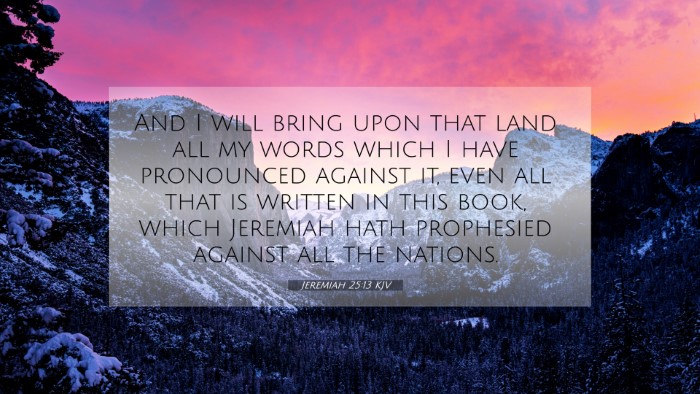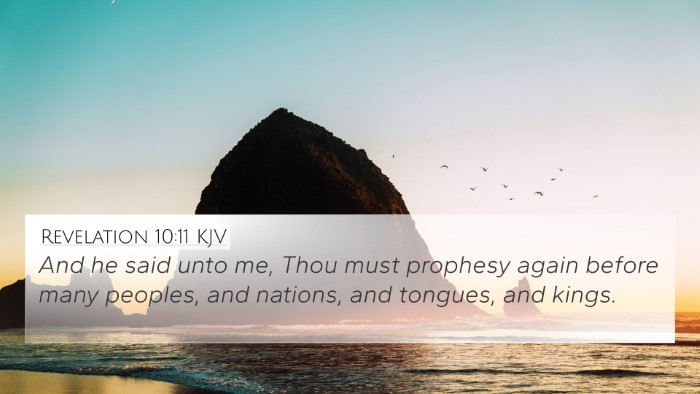Understanding Jeremiah 25:13
Jeremiah 25:13 states:
"And I will bring upon that land all my words which I have pronounced against it, even all that is written in this book which Jeremiah hath prophesied against all the nations."
Summary of Meaning
This verse encapsulates God's assurance that His prophetic words, as delivered through Jeremiah, will come to fruition. Jeremiah serves as a mouthpiece for the Lord, and the prophecies mentioned in the preceding context encompass judgments not only upon Israel but also upon surrounding nations. This serves as a profound reminder of God's sovereignty over nations and His commitment to His word.
Key Insights from Public Domain Commentaries
- Matthew Henry's Commentary: Henry emphasizes that God's words are certain and will not fail. He notes the importance of the written prophecies found in the book of Jeremiah, highlighting that God keeps His promises and that His judgments are both just and unavoidable.
- Albert Barnes' Notes: Barnes further elaborates on the scope of this prophecy, pointing out that it encompasses not just the foretelling of calamities but also the assurance of fulfillment. Barnes suggests that this verse stands as a stark warning to nations about the consequences of their actions regarding God's covenant.
- Adam Clarke's Commentary: Clarke stresses the significance of the phrase "all my words" as a comprehensive collection of God’s decrees. He highlights the inclusion of Israel’s specific transgressions and the broader implications for the nations surrounding them.
Cross-References
Jeremiah 25:13 resonates with numerous other Biblical texts, helping to forge connections between various passages. Here are some relevant cross-references:
- Isaiah 34:2: "For the indignation of the LORD is upon all nations, and his fury upon all their armies." - This verse echoes the theme of divine judgment.
- Ezekiel 14:21: "For thus saith the Lord God; How much more when I send my four sore judgments upon Jerusalem, the sword, and the famine, and the noisome beast, and the pestilence." - Similar judgments are predicted.
- Revelation 19:15: "And out of His mouth goes a sharp sword, that with it He should strike the nations." - A vision of God's ultimate judgment on the nations.
- Lamentations 2:17: "The LORD hath done that which he had devised; he hath fulfilled his word that he had commanded in the days of old." - A testament to the fulfillment of God's declarations.
- Zephaniah 3:8: "Therefore wait ye upon me, saith the LORD, until the day that I rise up to the prey." - Reflecting on God's assured judgment upon nations.
- Romans 1:18: "For the wrath of God is revealed from heaven against all ungodliness and unrighteousness of men." - A New Testament validation of divine judgment principles.
- 2 Peter 2:6: "And turning the cities of Sodom and Gomorrha into ashes condemned them with an overthrow, making them an ensample unto those that after should live ungodly." - An example of God’s judgment as seen in a historical context.
Thematic Connections and Analysis
In comparing the themes found in Jeremiah 25:13 with these cross-referenced verses, a pattern emerges in the Biblical narrative regarding God's sovereignty, judgment, and the certainty of His word.
God’s Sovereignty Over Nations
Various passages underscore God’s authority over the affairs of nations. His word, as delivered through prophets like Jeremiah, serves as a divine blueprint of actions resulting from the choices made by nations.
Judgment Foretold
Many of these verses highlight similar themes of judgment. For instance, Ezekiel’s prophecies align with the warnings issued in Jeremiah, demonstrating a cohesive voice throughout Scripture regarding the consequences of turning away from God's commandments.
Tools for Biblical Cross-Referencing
Studying such connections enhances understanding and provides deeper insights into the text's meaning. Consider exploring:
- Bible Concordance: A invaluable tool for locating verses based on keywords.
- Bible Cross-Reference Guide: Provides insights into verses that share themes and subjects.
- Covenant Studies: To understand how various covenants interrelate and impact prophecy.
- Comparative Bible Studies: Exploring parallels between the Old Testament prophecies and New Testament fulfillments.
How to Use Bible Cross-References
Using Bible cross-references effectively can illuminate thematic parallels and reinforce understanding:
- Identify key themes or adjectives in the verses.
- Look for connections in thematic study Bibles.
- Engage in group studies to discuss interpretations.
- Utilize online resources or concordances for broader searches.
Conclusion
Jeremiah 25:13 serves as a powerful reminder of God's faithfulness to His word. By exploring connections with other scriptures, believers can appreciate the rich tapestry of God's interactions with humanity throughout history and learn to apply these lessons in their lives today.







